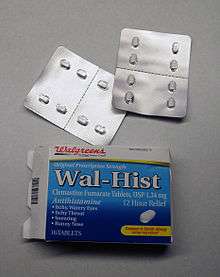Store brand
Store brands, also called own brands, are private label brands managed solely by a retailer for sale in only a specific chain of stores. The retailer will design the manufacturing, packaging and marketing of the goods in order to build on the relationship between the products and the store's customer base. Store-brand goods are generally cheaper than national-brand goods, because the retailer can optimize the production to suit consumer demand and reduce advertising costs. Goods sold under a store brand are subject to the same regulatory oversight as goods sold under a national brand. Consumer demand for store brands might be related to individual characteristics such as demographics and socioeconomic variables.[1]
Prevalence

A Food Marketing Institute study found that store brands account for an average of 14.5 percent of in store sales with some stores projecting they will soon reach as high as 20 percent of all sales.[2] Store branding is a mature industry; consequently, some store brands have been able to position themselves as premium brands. Sometimes store-branded goods mimic the shape, packaging, and labeling of national brands, or get premium display treatment from retailers. (For example, "Dr. Thunder" and "Mountain Lightning" are the names of the Sam's Choice store brand equivalents of Dr Pepper and Mountain Dew, respectively.)
Economic assessment
Research has found that some retailers believe that, while advertising by premium national brands brings shoppers to the store, the retailer typically makes more profit by selling the shopper a store brand. This assumption has led to a spurt in the academic and trade literature on the subject of positioning the store brand as compared with the national brand. The Fashion Institute of Technology publishes research on store branding and store positioning.[3]
In most cases, while store brands are usually cheaper than national (or even regional) brands, they remain more expensive than generic brands sold at the store. (e.g. Pittsburgh-based Giant Eagle selling their store brands for less than national brands but more than Topco's Valu Time generic brand.)
Grocery chains such as Aldi and Save-A-Lot primarily sell store brands to promote overall lower prices, compared to supermarket chains that sell several brands. Richelieu Foods, for example, is a private label company producing frozen pizza, salad dressing, sauces, marinades, condiments and deli salads for other companies, including Hy-Vee, Aldi, Save-A-Lot, Sam's Club,[4] Hannaford Brothers Co.,[5] BJ's Wholesale Club (Earth's Pride brand) and Shaw's Supermarkets (Culinary Circle brand).[5]
Another example is President's Choice in Canada, a major shop brand found in Loblaw group supermarkets.
Advantages of private branding
Private branding means a large distribution channel member (usually a retailer) buys from a manufacturer in bulk and puts its own name on the product. This strategy is generally only practical when the retailer does very high volume of sales. The advantages to the retailer are:
- more freedom and flexibility in pricing
- more control over product attributes and quality
- higher margins (or lower selling price)
- eliminates much of the manufacturer's promotional costs
- can fill category gaps that are not being filled by National Brands
- can aid in differentiation for the retailer as exclusive lines that are only available at that retailer
- can keep the National Brands competitive and innovative as they will now be fighting for shelf space with the Private Brands
The advantages to the manufacturer are:
- reduced promotional costs
- stability of sales volume (at least while the contract is operative)
- increase production capacity if not currently running at 100%
- can grow smaller local businesses as retailer would prefer using non National Branded manufacturers
References
- ↑ Baltas, George (2003). "A combined segmentation and demand model for store brands". European Journal of Marketing. 37 (10): 1499–1513. doi:10.1108/03090560310487211.
- ↑ "Store Brands Drive Differentiation and Profit". StoreBrandsDecisions.com. 2009-06-09. Archived from the original on 2010-11-03.
- ↑ Chevalier, Michel (2012). Luxury Brand Management. Singapore: John Wiley & Sons. ISBN 978-1-118-17176-9.
- ↑ "Richelieu experiences hiring boom, starts expansion". WCFcourier.com, RC Balaban, August 27, 2006.
- 1 2 "There's new appetite for peddlers of cheap eats". Boston Business Journal, Feb 23, 2009, Lisa van der Pool. 2009-02-23.
Further reading
- Kumar, Nirmalya; Steenkamp, Jan-Benedict E.M., Private Label Strategy - How to Meet the Store Brand Challenge. Harvard Business Press 2007
External links
| Look up store brand in Wiktionary, the free dictionary. |